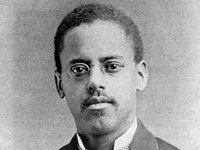The Immutable Impact of Black Scientists and Inventors
Your content has been saved!
Go to My Saved Content.February is a time when Americans reflect on the tremendous contributions of people of African descent. While names like Martin Luther King, Jr. and Rosa Parks are known, names of famous black scientists and inventors are not as common. Well, not until now. Let's examine some notable men and women who made great achievements in science, technology and engineering. Here are some examples of giants on whose shoulders we stand.
Elijah McCoy (1843-1929)
McCoy invented a system that helps machines lubricate their own parts without constant supervision -- he patented the "oil cup." Before his invention, manufacturing was expensive. In order to lubricate parts, machines had to be shut down and then oiled by hand. McCoy saw this need and created a solution. He then applied his invention to cars, trains, ships and other machines. With over 50 patents to his name, he had a brand for excellence, which is where the term "The Real McCoy" originates.
Lewis Latimer (1848-1928)
Thomas Edison was looking for a filament for his light bulb. He narrowed it down to carbon, but that burned out quickly. Lewis Latimer, a draftsman who worked for Alexander Graham Bell, took a job at Edison's lab. There he created a light bulb with a much more durable carbon filament. He also invented the threaded socket that we still use today. A leader in what we now call electrical engineering, he wrote one of the earliest textbooks on electrical lighting and supervised the installation of lighting in London, New York City and Montreal. Always tinkering, he has a range of patents from the first bathroom for trains to an early air-conditioner.
Granville T. Woods (1856-1910)
Granville T. Woods was known as the "Black Edison," since he was a prolific inventor. He had 150 patents, and 35 of them are in the field of electricity and electromagnets. His most notable invention was one that allowed messages to be sent between moving trains and train stations, which let stations know how far away trains were and led to safer travel. This invention, called "telegraphony," enabled communication using both voice and telegraph (an early form of Twitter). Woods is also credited with making a type of electromechanical brake. He sold many of his inventions to General Electric, Westinghouse and Bell Telephone, which freed him to work fulltime as an inventor.
Madam C.J. Walker (Sarah Breedlove) (1867-1919)
Madam C.J. Walker was a homegrown chemist who created a cosmetics empire, which made her a millionaire. In fact, she was the first self-made millionaire (of any race) according to the Guinness Book of World Records. She was a chemist-in-practice because she figured out in her kitchen how to make curly hair straight and how to make straight hair curly. She was an entrepreneur with a successful mail order company (an early form of Amazon). She also empowered other budding businesswomen by creating franchises that let them build their own businesses.
Garret Morgan (1877-1963)
Morgan was a self-educated inventor who created two inventions we still use: the gas mask and the stoplight. The story about the gas mask shows his ingenuity and his bravery. One night there was an explosion at a construction site, and men were trapped inside a tunnel. Morgan rushed to the scene with his gas mask and rescued the workers. His invention saved many soldiers in World War I and still keeps firefighters, engineers and chemists safe today. Morgan also created the stoplight, which he was inspired to make when a car accident happened outside of his house. At this time, cars were a new invention and accidents were starting to occur regularly. His invention had mechanical signs that let traffic know when to "stop" or "go," much like our stoplights today.
Imagine a Day Without Their Inventions
Black inventors have touched every part of our lives. Let's see what a day without their inventions would look like.
Well, if you reached for your shoes, they would not be there. Your shoes were crafted using a machine created by Jan E. Matzelinger. And your shirt would be crumpled, since Sarah Boone created the ironing board. Without black inventors, you could not comb your hair (Walter Sammons invented the comb) or brush it (Lydia O. Newman invented the brush). You would have to hang your laundry out to dry, since there would be no clothes dryer (if George T. Sampson hadn't invented it).
If you wanted to write yourself a note and your pencil point broke, you would not be able to sharpen it (John Love invented the pencil sharpener). And if you were hungry later in the day, you could not go to the fridge (which we can thank John Standard for inventing). If you went to the pantry to grab some peanut butter, it would not be there (George Washington Carver cultivated the peanut). Plus, you could not get relief on a hot day since there would be no air conditioning (for which we're really grateful to Frederick Jones). And you would have to take the stairs of a building, since there would be no elevator (Alexander Miles patented the elevator).
A day without African-American inventions would be a very bad day indeed. We have many people to thank for many of the things we use and enjoy. Admittedly, this is a short list of black inventors and scientists who have contributed to our world, but while the list is limited, we can be certain their impact is not.
